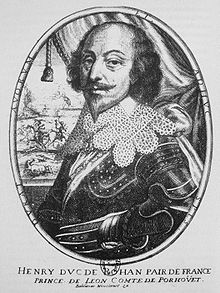Henri, duc de Rohan
| Henri II de Rohan | |
|---|---|
| Duke of Rohan | |
 |
|
| Wife | Marguerite de Béthune |
| Born | 21 August 1579 Château de Blain |
| Died |
13 April 1638 (aged 58) Bern |
| Buried | Geneva |
| Religion | Reformed |
Henri (II) de Rohan (21 August 1579 – 13 April 1638), Duke of Rohan and Prince of Léon, was a French soldier, writer and leader of the Huguenots.
Rohan was born at the Château de Blain (now a part of Blain, Loire-Atlantique), in Brittany. His father was René II, viscount of Rohan (1550–1586), and head of one of the oldest and most distinguished families in France, which was connected with many of the reigning houses of Europe. He was educated by his mother, Catherine de Parthenay, who was a woman of exceptional learning and force of character. Henri was by birth the second son, but when his elder brother René died young he became the heir of the name. He appeared at court and in the army at the age of sixteen, and was a special favourite with Henry IV, after whom, failing the House of Condé, he might be said to be the natural chief of the French Protestants. Having served till the Peace of Vervins, he travelled for a considerable time over Europe, including England and Scotland, in the first of which countries he received the not unique honour of being called by Elizabeth her knight, while in the second he was godfather at Charles I's christening.
On his return to France Henri was made duke and peer at the age of twenty-four. From 1593 onward, there had been negotiations of marriage between him and Princess Catherine of Sweden, but in 1603, however, he married Marguerite de Béthune, the duc de Sully's daughter, and transferred the Rohan family seat from Josselin Castle to Pontivy. He served in high command at the celebrated siege of Jülich in 1610, but soon afterwards he fell into active or passive opposition to the government over the religious disputes. For a time, however, he abstained from actual insurrection, and he endeavoured to keep on terms with Marie de Medici; he even, despite his dislike of De Luynes, the favourite of Louis XIII, reappeared in the army and fought in Lorraine and Piedmont.
...
Wikipedia
